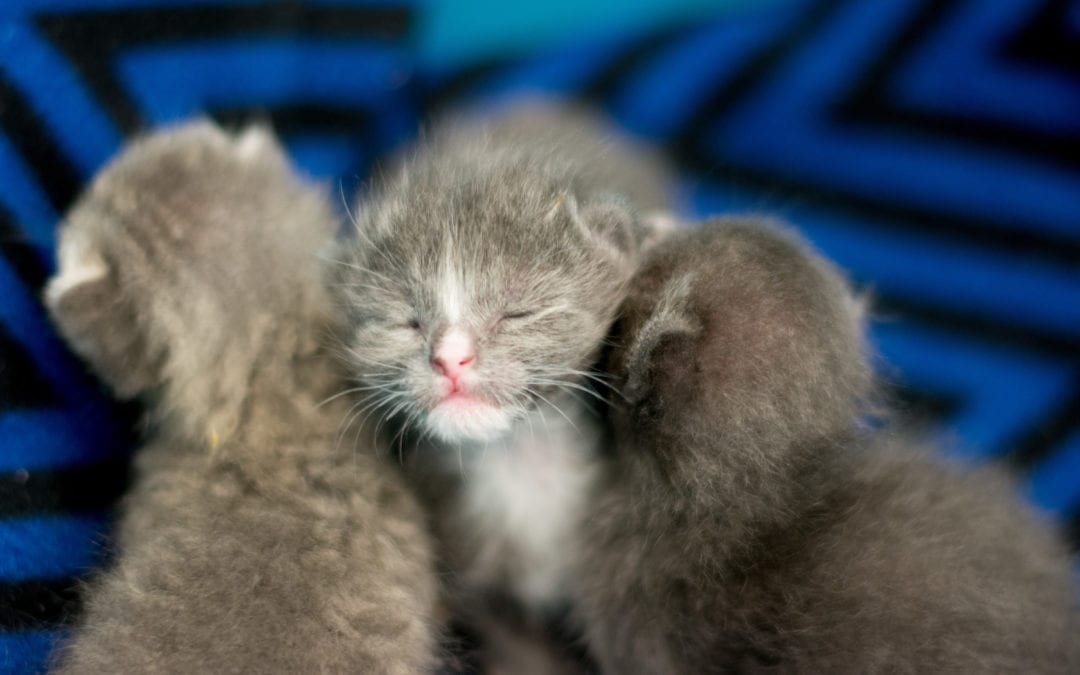Kitten Season is Coming!

Kitten season is coming to Arkansas and the Humane Society of Pulaski County (HSPC). That is the time of year when most unaltered cats go into heat. In Arkansas, this lasts primarily from February through November. During this time, it’s not unusual to discover a nest of unattended kittens or a single kitten that appears to have been abandoned by their mother. Fight the instinct to rescue them immediately, and instead consider the following recommendations.
Wait & Watch
You might have found the kittens while their mother is searching for food, or is in the middle of moving them to a new location. Try to determine if the mother is coming back for them, or if they are truly orphaned.
To do this, stand far away from the kittens — 35 feet or more. If you stand too close, the mom may not approach her kittens. You might need to go away completely before a feral mama cat will return to her kittens. It could be several hours before the mother cat returns or until she is certain there are no more humans hovering around her litter.
However, if the kittens are in immediate danger, you may want to take action earlier. For example, is it raining heavily? Are there loose dogs or other animals in your neighborhood that could harm the kittens? Are the kittens located where there is lots of foot or car traffic? If so, you may want to take further action.
Please realize that it might take several hours for the mother cat to return, and healthy kittens can survive this period without food as long as they are warm. Neonatal kittens (usually with their eyes closed and/or unable to walk without wobbling) are much more at risk of hypothermia than they are of starvation. During spring and summer months, waiting a short while to see if mom will come back is much safer than during frigid winter months.
Know that the mother cat offers her kittens the best chance at survival, so wait and watch as long as you can. The best food for the kittens is their mother’s milk. Remove the kittens only if they are in immediate, grave danger.
Helping if the mother cat returns…
If mom returns and the area is relatively safe, leave the kittens alone with mom until they are weaned. If you can, offer shelter and regular food to mom. However, keep the food and shelter at a fair distance from each other. Momma cat will appreciate the food but may not accept the shelter if the food is too close. Food too close to home will attract other cats or prey animals close to her nest, causing momma to reject the space and move the kittens somewhere else.
One the kittens are about six weeks old. it is usually OK to take the kittens from the mother for socialization and adoption placement. You can place the kittens through rehoming sites sites like rehome.adoptapet.com or through a local shelter. Female cats can become pregnant with a new litter even while they are still nursing, so don’t forget to get the mother cat spayed or you will have more kittens soon! Low-cost spay options in central Arkansas can be found here.
OR: If the mother cat does not return…
If you discover that mom has been hit by a car, etc, or if for any reason it appears that she is not coming back, then you should remove the kittens. This is crucial to the kittens’ survival. But you must be prepared to see this project through to weaning if you decide to intervene!
If you take the kittens in, know that while HSPC has an OUTSTANDING foster network, we may not have available staff to take on bottle-feeding on very short notice. Planning is necessary to mobilize our foster network and get help. You can also try your local shelter, but know that many city animal shelters and veterinarians cannot take in newborn kittens since they do not have the staff to feed and stimulate them to go potty around-the-clock (yep, the little ones can’t even do that by themselves).
You can contact HSPC at (501) 227-6166 and we will try to identify an available foster to bottle-feed the kittens, but this could take hours or even days. You can also email fostering@warmhearts.org after hours for assistance. Again, we can not always help, but we will always try. If a bottle feeder is not available or you want to help them yourselves, we will provide you with a crash course on bottle-feeding to help, if possible.
Other Ways You Can Help
- FOSTERING: If you would like to join us in our life-saving mission and learn to bottle feed kittens (or puppies), you can find more information and an application on our Becoming a Foster page.
- DONATING: You can also help the foster program by purchasing an item (or items!) from our Amazon Foster Program wish list!
(Article modeled from http://www.animalalliancenyc.org/wordpress/2013/05/what-to-do-and-not-do-if-you-find-a-newborn-kitten/)

